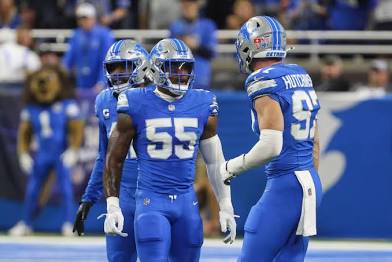Last week, we examined the contract of Detroit Lions free agent addition D.J. Reed, which featured a unique structure compared to previous Lions contracts. Instead of a high salary in the final year, Reed’s deal placed that money into an option bonus, allowing the Lions to prorate the cap hit into the year after he might leave. Now, a deeper dive into Derrick Barnes’ contract reveals it mirrors Reed’s in terms of structure, utilizing void years and an option bonus to spread cap hits over the next four seasons.
Here’s a comparison of the two contracts:
As seen in both contracts, the largest cap hits occur in Year 2. The notable dip in Year 3 is due to a sizable 2028 dead cap hit, stemming from the Lions’ relatively new strategy of incorporating option bonuses in the final year of contracts.
But why are the Lions creating additional cap space for 2027 while potentially taking on large cap hits in 2028? For one, it’s more manageable to spread a cap hit across two years instead of one. If that signing bonus had been part of the salary, it would create a massive hit in 2027.
Furthermore, assuming the salary cap continues to rise, cap hits in future years represent a smaller portion of the overall cap. For example, a $40 million cap hit would be 20% of a $200 million cap, but with a $220 million cap, it would represent only 18%. This gives teams more flexibility to carry over dead cap to future years.
Another factor could be the Lions’ roster moves in 2028. By then, Jared Goff will be 34 and in the final year of his current deal, potentially allowing the Lions to move on and bring in a new quarterback, perhaps one on a rookie deal. It’s also the final year of Amon-Ra St. Brown and Alim McNeill’s big extensions. At that point, the Lions could either release them, saving $22 million each, or negotiate new extensions, which would reduce their cap hits significantly.
In 2028, St. Brown’s option bonus also comes into play, and if declined, it could save another $20 million in cap space.
One other important factor in the cap planning involves the NFL’s television deal, which has an opt-out clause after the 2028-29 season. A new deal could result in a significant cap increase, similar to the 14% jump after the last TV deal. While the cap increase is likely, it still leaves teams in a position to manage future cap hits effectively.
The option bonus also offers the Lions a relatively easy out after two seasons, similar to a non-guaranteed salary. If Detroit decides to move on from Barnes after two years, the cap impact is more manageable than a traditional contract structure.
Overall, the Lions’ cap management continues to evolve, with innovative strategies like option bonuses spreading cap hits over multiple years. This ensures the team remains competitive in both the short and long term, balancing their current roster needs with future flexibility.
